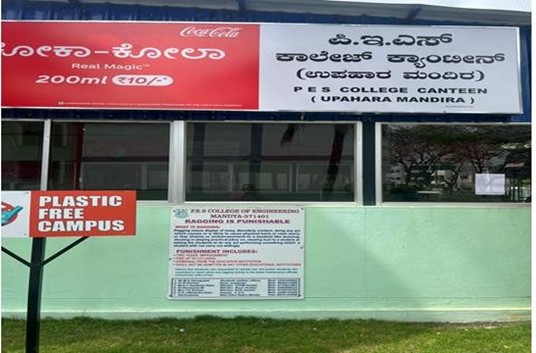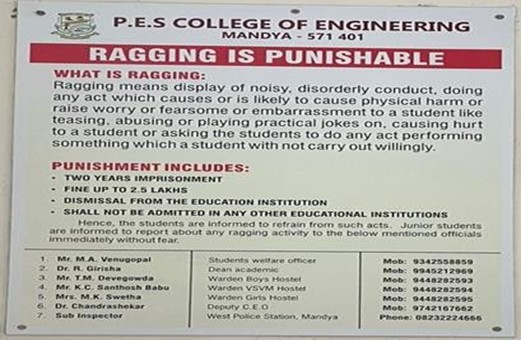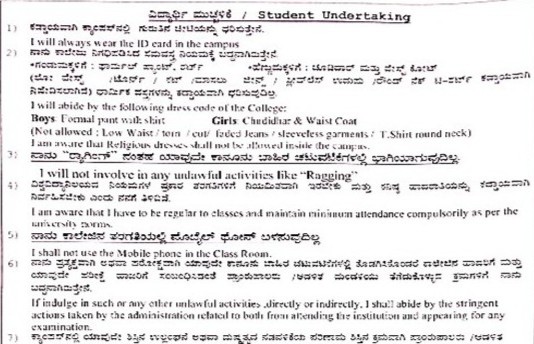Committee’s
At PES College of Engineering, Mandya, we are dedicated to creating a safe, inclusive, and supportive environment for our students, faculty, and staff. To uphold these values, the institution has constituted several committees, including the Anti-Ragging Committee, Anti-Sexual Harassment Committee, Internal Complaints Committee (ICC), and SC/ST Cell. These committees play a pivotal role in addressing grievances, ensuring safety, promoting awareness, and fostering an equitable atmosphere on campus. They actively work towards preventing issues such as ragging, harassment, and discrimination, while also providing a platform for confidential redressal of concerns. Through regular monitoring, awareness programs, and strict adherence to policies, these committees ensure that the college remains a harmonious and nurturing space for holistic growth and learning.Click here to file Issue
ICC
PESCE, Mandya is a coeducational institution that ensures equal opportunities for Men and women to collaborate in a respectful and harmonious environment. The ICC is constituted to keep a watch on sexual harassment cases in the campus. The Internal Complaints Committee has two major functions
- Preventive: To work towards creating an atmosphere promoting equality, non-discrimination and gender sensitivity.
- Remedial: To receive and take cognizance of complaints made about sexual harassment and to conduct enquiries into the complaints.
The college is committed in providing a safe and conducive work and academic environment to students and its employees and is extremely alert to any matters pertaining to harassment and gender sensitivity. The Internal Complaints Committee (ICC) has been re-constituted for the term 2024-2026. The ICC aims to create a zero-tolerance environment for sexual harassment. The Committee meets at regular intervals to monitor and ensure that no cases of sexual harassment are reported in the campus. However, any complaints regarding physical contact, requests for sexual favors, inappropriate remarks, or any unwelcome physical, verbal, or nonverbal expressions of a sexual nature will be taken seriously. Such issues will be addressed, and appropriate action will be taken.
The purpose of this cell is to raise awareness among students and staff and to actively work towards preventing sexual harassment within the college. Any complaints related to sexual harassment should be reported to the Committee, which will take necessary disciplinary actions.
Who can approach ICC?
Any aggrieved woman who has suffered sexual harassment at workplace can approach ICC.
| Sl No | Name | Designation | Contact Number with Mail ID | Status in Committee |
|---|---|---|---|---|
| 1 | Dr. Anitha. M. L. | Professor and Program Head, Department of Computer Science and Engineering (Data Science) | 9945576186 anithaml@pesce.ac.in |
Presiding Officer |
| 2 | Dr. Nanda. B. S. | Professor, Department of Electronics and Communication Engineering | 9844544709 nandabs@pesce.ac.in |
Member |
| 3 | Prof. Deepika | Assistant Professor, Department of Computer Science and Engineering | 9482024207 deepika@pesce.ac.in |
Member |
| 4 | Dr. Bindiya. J. | Consultant Psychiatrist, PESCE, Mandya | 9844934318 appaji.amma@yahoo.co.in |
Member |
| 5 | Smt. Aruna Yogesh | Social Worker (NGO) | 9036182720 arunaminchu123@gmail.com |
Member |
Any student / teaching staff/ non-teaching staff who wishes to file a sexual harassment complaint can contact any member of the ICC committee.
Click here to file IssueOverview
Anti-Sexual Harassment Committee is formed in the college for the safety of the girl students and to solve the complaints of girl students and women faculties. It is established according to the law Anti- sexual Harassment at work place prohibition, Protection Act. 2003. This committee also follows Vishakha guidelines. It works to create awareness among students regarding Male-Female Equality.
Objectives
- Provide an environment free of gender-based discrimination.
- To solve complaints of girl students and women teachers.
- To solve complaints regarding sexual harassment.
- To create awareness about safety measure made for students.
- To increases involvement of girl students in various activities run in the college.
Committee
| Sl No | Name | Designation | Status in Committee |
|---|---|---|---|
| 1 | Dr. N L Murali Krishna | Principal | Chairman |
| 2 | Dr. M Veena | Professor, Head of Dept. of MCA | Member |
| 3 | Dr. M L Anitha | Professor, Head of Dept. of Data Science | Member |
| 5 | Dr. T M Geethanjali | Associate Professor, Head of Dept. of CSBS | Member |
| 6 | Smt. Shwetha M K | Assistant Professor, Dept. of CS&E | Co-ordinator |
| 7 | Dr. D M Shrinivas | Assistant Professor, Dept. of E&E | Member |
| 8 | Swapna Kumbar | Student | Member |
| 9 | Mythri | Student | Member |
Anti-Ragging Policy-PESCE
In accordance with the directives issued by the Honorable Supreme Court in SLP No. 24295 of 2006, dated 16-05-2007, and Civil Appeal No. 887 of 2009, dated 08-05-2009, mandating the prohibition, prevention, and eradication of the menace of ragging, an Anti-Ragging Committee shall be constituted.
Proclamation of Adoption
Whereas the Anti-Ragging Committee of PES College of Engineering Mandya is committed to maintaining a safe and inclusive environment for all students; and whereas it is imperative to eliminate ragging practices to uphold the dignity and well-being of students, Now, therefore, the Anti-Ragging Committee hereby proclaims the adoption of the Anti- Ragging Policy, effective immediately. This policy shall be binding on all students, faculty, and staff and shall include preventive measures, complaint mechanisms, and disciplinary actions for any violations.
The policy will be implemented under the guidance of the Dean of Student Welfare and the Anti-Ragging Committee. All stakeholders are urged to ensure compliance and actively contribute to creating a ragging-free campus.
Procedures for Modifying this Policy
This policy may be revised to alter its composition, whether by modifying the number of members, specifying grounds for member termination, or other necessary adjustments. Any proposed amendment must include a detailed justification outlining the rationale for the change and shall require the approval of the majority of the Committee members. The Principal is authorized to initiate and oversee the necessary steps for implementing such revisions.
Scope of Autonomy
The Committee shall exercise full autonomy in executing its responsibilities. To enhance the operational efficiency of the Committee, the Principal shall allocate clerical, infrastructural, and support staff resources as deemed necessary to fulfill the Committee's requirements.
Objectives
- To unequivocally prohibit, prevent, and eradicate any behavior by students towards others, particularly freshers, that involves:
- Verbal or written expressions or actions that result in teasing, mistreatment, or disrespectful conduct.
- Engagement in unruly or disruptive activities.
- Infliction of shame, humiliation, or distress, aimed at deriving sadistic pleasure or asserting dominance, power, or authority.
- Disruption of regular academic functions and activities.
- Exploitation of freshers or other students for personal academic gain.
- Any act of financial extortion or coercive imposition of financial burdens on freshers or fellow students.
- Physical abuse or harassment of any form.
- Verbal, digital, or public abuse, including insulting communications via speech, emails, or social media.
- To ensure the holistic physical and psychological development of all students in a secure and supportive environment.
Functions of the Anti-Ragging Committee
- To ensure strict adherence to the Anti-Ragging Regulations and relevant legal provisions in force regarding ragging prevention.
- To conduct thorough investigations in cases of ragging and submit detailed reports with actionable recommendations.
- To decide on appropriate punitive actions, considering the circumstances, severity, and nature of each ragging incident.
- To organize professional counseling sessions during admissions to support freshers in maintaining balanced psychological well-being.
- To enhance student awareness regarding legal ramifications of ragging through specialized seminars and awareness programs.
- To spearhead wide-reaching public awareness campaigns, including rallies and distribution of informational booklets, highlighting the detrimental effects of ragging.
- To actively promote anti-ragging initiatives through the display of prominent “No Ragging” posters on notice boards and throughout campus facilities.
Responsibilities of the Institution in Preventing Ragging
To effectively combat ragging, the institution shall implement the following measures:
- The Anti-Ragging Regulations shall be prominently included in the admission brochure or instructional booklet provided to prospective candidates, ensuring awareness from the outset.
- The admission application form shall contain an affidavit, duly signed by the applicant, affirming their knowledge of the laws pertaining to the prohibition of ragging, including the corresponding penalties. The affidavit shall further state that the candidate understands that involvement in ragging or abetting it will result in appropriate disciplinary action.
- The admission application shall also include an affidavit from the parent/guardian of the applicant, acknowledging their awareness of the anti-ragging laws and consenting to the punishment imposed upon their ward if found guilty of ragging or its abetment.
- The admission application must be accompanied by the applicant's School Leaving Certificate or Character Certificate, which shall include a detailed report on the applicant’s behavior. This will allow the institution to monitor students with previous negative behavioral patterns more closely.
- Applicants seeking hostel accommodation must submit an additional affidavit, along with their hostel application, confirming their awareness of anti-ragging laws and agreeing to abide by the consequences if found guilty of ragging or abetting such behavior.
- The institution shall coordinate with the Hostel Warden to ensure stringent monitoring of seniors’ access to freshers’ accommodations, preventing any potential instances of ragging.
- Mentor-mentee meetings shall be conducted regularly to provide a supportive framework for students, ensuring early identification of any issues related to ragging or other misconduct.
- The institution shall implement enhanced security measures across its premises, particularly at areas identified as vulnerable, to safeguard students and prevent incidents of ragging.
Forms of Punishment
Depending on the nature and severity of the offense as determined, the institution may impose any one or a combination of the following punitive measures on individuals found guilty of ragging:
- Cancellation of Admission: Revocation of admission to the institution, rendering the student ineligible for continued enrollment.
- Suspension from Academic Activities: Temporary suspension from attending classes, preventing participation in academic pursuits for a specified period.
- Withholding or Withdrawal of Financial Support: Suspension or withdrawal of scholarships, fellowships, or any other financial benefits or institutional support.
- Disqualification from Institutional Representation: Prohibition from representing the institution in any official capacity, including participation in academic meets, sports tournaments, cultural festivals, or similar events.
- Suspension or Expulsion from Hostel: Temporary or permanent removal from hostel accommodation, thereby restricting access to hostel facilities.
- Expulsion from the Institution: Permanent removal from the institution, effectively terminating the student’s enrollment and access to all institutional privileges.
These measures will be enforced in accordance with the seriousness of the incident, ensuring a zero-tolerance approach to ragging.
Composition of the Anti-Ragging Committee
The Anti-Ragging Committee shall be established by the Principal to ensure effective implementation and adherence to anti-ragging protocols within the institution. The Committee will be structured as follows:
Chairperson
- The Committee shall be led by a Principal, designated as the Chairperson who shall bear overall responsibility for the formulation and execution of anti-ragging policies, the investigation of complaints, and the enforcement of disciplinary actions.
- The Chairperson will serve as the primary point of contact for all matters related to ragging and shall coordinate with the institution's administration, and faculty, to maintain a vigilant and proactive approach.
Faculty Members:
- The Committee will include one or two faculty members who shall serve as Members of the Committee.
- These members will bring their academic expertise and institutional experience to bear on the Committee's deliberations, assist in conducting thorough investigations, and collaborate in decision-making regarding the appropriate response to incidents of ragging.
- Faculty members will also contribute to awareness programs, educational outreach, and the promotion of a culture of mutual respect and dignity among students.
Specialized Experts (Optional):
- Depending on the scope of the institution’s requirements, additional members such as a Sub Inspector, Psychologist, Legal Advisor, or Hostel Warden may be included to provide specialized expertise in mental health, legal matters, or hostel management.
- These members will offer critical support in cases requiring counseling, legal interpretation, or effective management of hostel environments, further strengthening the Committee's ability to address ragging from all angles.
The Committee's structure is designed to promote collaboration and ensure that all aspects of ragging prevention, investigation, and education are handled with the utmost seriousness, fairness, and efficiency.
Tenure of the Committee
- The tenure of the Anti-Ragging Committee shall be for a period of three years, ensuring stability and continuity in the committee's efforts to prevent and address ragging within the institution.
- The tenure of the Chairperson and Committee members shall be determined at the discretion of the Principal, taking into account institutional requirements and the need for leadership continuity and effective participation. The Principal reserves the right to review and reconstitute the Committee, should the need arise, based on the evolving needs of the institution.
Appointment, Suspension, and Removal of Members
- The Chairperson and the faculty members serving as members of the Anti-Ragging Committee shall be appointed by the Principal, who will ensure the selection of qualified individuals for effective oversight and management.
- The Chairperson shall issue a formal circular announcing the constitution of the Committee, providing details regarding its formation and calling for student volunteers to become members, thereby ensuring transparency and inclusivity in the process.
- In the event of a vacancy arising due to the resignation or removal of any faculty member, the Principal shall reconstitute the Committee by appointing a suitable replacement, ensuring the continued functionality and integrity of the Committee.
Reformation of the Committee
In the event of the retirement, removal, termination, or suspension of the Chairperson or any Committee member, the Principal shall initiate the reformation of the Committee, ensuring its continued effectiveness and functionality. This process will involve appointing suitable replacements to uphold the Committee’s core functions and responsibilities.
Meetings
The Committee shall convene meetings as deemed necessary or appropriate. Meetings will typically be organized to discuss the planning and execution of events or programs related to anti-ragging initiatives. Attendance at these meetings is mandatory for all members.
Quorum for the Meeting
The quorum for any meeting shall be constituted by the presence of no less than two-thirds of the total members designated to attend, ensuring that a substantial representation is present for the meeting to proceed and for any decisions made to carry full validity.
Procedure for the Meetingk
- All meetings shall be convened by the Chairperson, with prior written notice provided to all members, ensuring adequate time for preparation and participation.
- Attendance at meetings is mandatory for faculty members, emphasizing the importance of full participation in discussions and decision-making.
- The Chairperson shall ensure that Minutes of the Meeting are meticulously recorded, capturing the key discussions, decisions, and actions to be taken.
- The Proceedings of the meeting shall be formally endorsed by the Chairperson, Committee members, and the Principal, through their signatures, to validate the decisions and outcomes of the meeting.
Reconstitution Of Anti-Ragging Committee
The Anti-Ragging committee has been re constituted as under consequent on the appointment of Dr. N.L Murali Krishna as principal with effect from 01/01/2025 in place of Dr. H M. Nanjunda Swamy for the academic year 2025-2027.
| Sl No | Name | Composition |
|---|---|---|
| 01 | Dr. N L Murali Krishna Principal, PESCE, Mandya |
Chair Person |
| 02 | Dr. VinayS Vice Principal, PESCE, Mandya |
Member |
| 03 | Dr. D M Srinivasa SWO(Boys), PESCE, Mandya |
Member |
| 04 | Dr. Charan Kumar HC Deputy.SWO (Boys), PESCE, Mandya |
Coordinator |
| 05 | Dr. Anitha M L SWO(Girls), PESCE, Mandya |
Member |
| 06 | Sri B.S. Yoga Assistant Professor, Dept of CS&E, PESCE, Mandya |
Member |
| 07 | Sub Inspector of Police West Police Station, Mandya |
Member |
| 08 | Sri Nandeesh S AAO, PESCE, Mandya |
|
| 09 | Dr. M.R Srinivas Warden Boys Hostel, PESCE, Mandya |
Member |
| 10 | Smt. M.K Shwetha Warden Girls Hostel, PESCE, Mandya |
Member |
Click here to file Issue
The SC/ST/OBC CELL has been re-constituted as under consequent on the appointment of Dr. N.L.Murali Krishna as Principal with effect from 10-01-2025
SC/ST/OBC Grievance
Scheduled Castes (SC) and Scheduled Tribes (ST) have been identified as the two most backward groups of Indian Society. They include all the castes, races or tribes, which have been socially, economically and educationally backward. The cell has been established to support and to bring students from such communities in the main stream.
Procedures for Amending this Policy
This Policy can be amended for the purpose of changing the composition either by reducing or increasing the membership, grounds for terminating the members etc. By incorporating a statement as to why the amendment is required to be made to the Policy and the same has to be approved by majority of the members of the Cell. The Principal will then take necessary steps for such a replacement.
Extent of Autonomy
The Cell will have complete autonomy in the performance of their tasks. In order to improve the work efficiency of the Cell, the Principal will make allocations of clerical, infrastructural and supporting staff assistance if and whenever required by the Cell.
Objectives
- Counsel and guide SC/ ST students and help them to manage academic and personal issues of college life effectively.
- Ensure provisions of an environment where all such students feel safe and secure.
- To provide the mechanism to redress the grievance of SC/ST students, if any
- To ensure protection and reservation as provided in the constitution of India.
- To arrange for special opportunities to enhance the carrier growth
- Inform the SC/ST students regarding various scholarships program of State Govt. and UGC.
- To take such follow up measures to achieve the objectives and targets laid down by the Govt. of India and the UGC.
Composition/Structure
- The Cell shall be presided by a Coordinator appointed by Principal shall comprise of a faculty member, Administrative staff appointed by the Principal and other student members.
- Upon the termination of services of either the Coordinator or the faculty member, the one in continued employment will hold the position of Coordinator, until any further appointment made by the Principal. The Principal will appoint a new faculty member to assist the Coordinator.
- Upon the termination of services of both Coordinator and the faculty member in charge, the Principal will reconstitute the Cell by making new appointments for filling the positions of Coordinator and faculty member.
- Any student of PESCE is eligible to become a member of the Cell.
- Membership is voluntary. However, one is considered a member in the given academic term only if he or she has attended at least half of the group meetings in the current term.
- Principal Chairman
- Coordinator -Dr. Prakasha.M.N, Assistant Professor Department of mathematics
- SC - Member - Sri. Hanumanthaiah, Helper in E&C Engg
- ST - member- Dr. R.Manjunath, Assistant Professor E&C Engg
- SC- Women -Member- Smt. Deepika, Assistant Professor CS& Engg
- OBC - Member- Sri T.M. Devegowda, Assistant Professor Mech Engg
SGRC policy
PES College of Engineering, Mandya is dedicated to fostering an environment that supports students' academic and overall growth. Therefore, in accordance with section 5 of the University Grants Commission (Redress of Grievances of Students) Regulations, students have the opportunity to seek redress of their grievances through the Student Redressal Grievance Committee. The committee plans to resolve the complaint in the most honest, equitable, and private manner possible.
Title: This policy will be known as "The PESCE Grievance Redressal Committee Policy" (henceforth referred to as the Policy).
Objectives
The committee's goals are as follows:
- To give students a chance to freely and anonymously voice their complaints.
- To establish a procedure for the grievance's fast and effective resolution.
- To provide appropriate counselling to the students in the grievance process.
- To make the most effort to reach students who are entitled and in need of assistance.
- To make decisions and settle complaints in the most unbiased and equitable way possible.
- To address the issues raised by the college's students and encourage cordial interactions between students and teachers as well as between students.
- Additionally, it encourages students to openly and honestly communicate their issues and frustrations without fear of retaliation. Any concerns pertaining to either mental or physical harassment in the classroom, instructor methods, classroom management, syllabus fulfilment, etc.
Definition
- According to Regulation 2(h) of the UGC Regulations, a grievance is any complaint or dissatisfaction, whether voiced or not, pertaining to academic and non-academic matters, including grievances pertaining to internal assessments. With the caveat that complaints filed with the SC/ST Commission, Anti-Ragging Committee, and Sexual Harassment Committee would not be included in the grievance.
- The Committee established under this policy in accordance with the UGC Regulations, is known as the Student Grievance Redressal Committee.
- A student who has any complaints about issues related to or associated with the grievances specified under the UGC Regulations is considered an aggrieved student.
- A student is someone who is enrolled in or applying to be admitted to the college.
The composition and structure of the committee:
The committee shall consist of:- Principal of the college – Chairperson;
- Four senior members of the teaching faculty to be nominated by the Principal – Members;
- A representative from among students of the college to be nominated by the Principal based on academic merit/excellence in sports/performance in co-curricular activities – Special Invitee.
Functions
- To review the complaints received by the SGRC.
- To evaluate the complaints in accordance with the natural justice standards.
- To provide a report, together with any suggestions, to the principal of the college within 15 days of receiving the complaint.
- To carry out surveys to determine students' issues and offer appropriate solutions
- To conduct the surveys to identify the problems of students and provide suitable solutions
Procedure for filing a complaint
- By sending an email to generalgrievance@pesce.ac.in; or
- Through the online portal provided on the website of the college; or
- By dropping the complaint in the grievance box;
Any aggrieved student can submit a complaint:
However, the committee also reserves the right to receive the complaint in its own way.
Further,
where a complaint is found to be false or frivolous, disciplinary action will be taken.
Grievance Procedure
- On receipt of a complaint, the college shall refer the complaint to the SGRC, along with its comments, within 15 days of receipt of the complaint.
- The Committee shall fix a date for hearing the complaint, which shall be communicated to the aggrieved student.
- An aggrieved student may appear either in person or authorize a representative to present the case before the Committee.
- Within 15 days after receiving the complaint, the Committee must report to principal of the college with any suggestions it may have.
A three-tiered process has been established to address grievances about internal assessments:
First, the concerned course instructor will be made aware of the grievance.
Second, the class teacher or mentor may be contacted if the problem is not addressed or
remedied.
Lastly, the Student Grievance Redressal Committee will be consulted if the complaint
continues to exist.
The interests of the offended student will be taken into account during the grievance
redressal process, and the SGRC will make every attempt to address the issue within seven
days.
Exclusions
SGRC will not consider the following issues.
Decisions of the Academic Council / Board of Studies and other academic administrative
committees constituted by the college.
Decisions with regard to award of scholarships/fee concessions/awards medals.
Decisions made by the college in accordance with the Misconduct and Discipline Rules.
The appropriate authority makes decisions regarding the results of the assessment and
examination.
| Sl No | Name | Composition |
|---|---|---|
| 1 | Dr.N L Murali Krishna Principal, PESCE, Mandya 9986741909 | Chair Person |
| 2 | Dr. Vinay S Vice-Principal, PESCE, Mandya 9986515835 | Member |
| 3 | Dr. Dinesh Prabhu B Dean (Academic), PESCE, Mandya 9480477812 | Member |
| 4 | Dr. D M Srinivasa SWO (Boys), PESCE, Mandya 9448233256 | Member |
| 5 | Dr. Anitha ML SWO (Girls), PESCE, Mandya 9945576186 | Member |
| 6 | Dr. Jayashankar M S Assistant Professor, Dept. of CS & Engg, PESCE, Mandya 9986398495 | Member/ Co-ordinator |
| 7 | Varun K Dept. of E&E Engg., PESCE, Mandya 7019254356 | Special Invitee |








